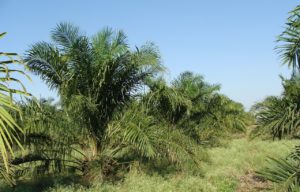Palm Oil:
Why You Should Avoid It
By Emily Powell
 Palm oil is in half of the products sold in grocery stores. Looking through the labels on foods in my pantry, I’ve found it in my peanut butter, crackers, granola bars, chocolate chips, cereal, and canned soup. It’s all over my kitchen, and probably all over yours, too. But why is it such a big deal?
Palm oil is in half of the products sold in grocery stores. Looking through the labels on foods in my pantry, I’ve found it in my peanut butter, crackers, granola bars, chocolate chips, cereal, and canned soup. It’s all over my kitchen, and probably all over yours, too. But why is it such a big deal?
Because of its incredibly high yield and low production costs, palm oil is one of the fastest growing commodity food products in the world, and it’s grown primarily in tropical areas within Indonesia and Malaysia. However, this rapid expansion and production (it’s estimated that palm oil accounts for over 65% of vegetable oil traded globally) has turned into a bit of a problem for the sustainable development of international agriculture and worldwide biodiversity, leading to serious and persistent resistance from advocacy groups such as the World Wildlife Fund. The WWF laments the social and ecological damage of clearing tropical rainforests in undeveloped areas for palm oil plantation, including forcing indigenous people off their original land and damaging vital ecosystem services such as natural water purification and soil preservation.
Additionally, deforestation of tropical forests through manmade fire continues to be a main contributor to climate change, reducing the capacity for carbon sequestration in vegetation and releasing metric tons of carbon dioxide and pollutants into the atmosphere. Native species such as the orangutan, tiger, rhinoceros and elephant have lost most or all of their habitat to oil palm plantations since demand for the product has skyrocketed. This has drastically reduced their population numbers and has garnered worldwide attention from environmental experts.
As the standard of living in developing countries expands and improves, more people are able to afford and have access to manufactured products made with palm oil. This continues to raise the demand for such lucrative commodity crops. However, as more political support is turned towards ensuring the sustainable production of food products for future populations, organizations such as the WWF and the Roundtable on Sustainable Palm Oil have worked towards establishing “sustainable palm oil” criteria and encouraging best management practices for current oil palm plantations in attempts to limit further sacrificing of tropical forest ecosystem services. Plantations which operate under a sustainable certification fulfill certain baseline requirements, including that the “plantation was established on land that did not contain significant biodiversity, wildlife habitat or other environmental values, and meets the highest environmental, social, and economic standards as set out by the RSPO” (WWF).
Although this program is a smart advancement in improving traceability within supply chains and allow the consumer market to demand a certified product, it has not necessarily done so. For example, in 2013, 15% of the world’s palm oil was certified as sustainable. However, the next year only half of that certified sustainable product was sold as “certified sustainable.” This means that the traceability of sustainably grown palm oil is limited and consumers are not always able to distinguish which products contain certified sustainable palm oil and which do not. In the United States, we almost can’t ever tell if the palm oil in our foods is sustainable.
In order to take action against climate change, biodiversity loss and social injustice worldwide, we must make conscious decisions about what we choose to buy and eat. These decisions must include reading the side of the box before we toss a product into our grocery cart and staying informed about the impacts of the production and manufacturing of each ingredient. Until we can raise enough awareness to place a demand on companies to start labeling the sustainability of their palm oil, it’s best for us to stick with other, more sustainable alternatives.
 Emily’s exuberant passion for sustainability and sustainable nutrition stems from her everlasting love for the outdoors, people, dirt, and broccoli. As an undergraduate in the School of Sustainability at Arizona State University, Emily is working towards becoming a spokesperson for everyday sustainable food and lifestyle choices, including decisions on what foods you buy, where you buy them, and how you make the most of foods’ energy. Leveraging communication through writing, Emily has been recognized in competitions such as the DuPont Challenge and the Apprentice Ecologist Initiative for her essays on sustainability issues and initiatives, including Honeybee Colony Collapse Disorder and community gardens in elementary schools. Emily aspires to utilize relationships with other academic disciplines to plant the seeds of sustainability and nutrition principles in the young adults of her generation. She plans to earn her Registered Dietitian credential and work either on the community or personalized sustainable nutrition level.
Emily’s exuberant passion for sustainability and sustainable nutrition stems from her everlasting love for the outdoors, people, dirt, and broccoli. As an undergraduate in the School of Sustainability at Arizona State University, Emily is working towards becoming a spokesperson for everyday sustainable food and lifestyle choices, including decisions on what foods you buy, where you buy them, and how you make the most of foods’ energy. Leveraging communication through writing, Emily has been recognized in competitions such as the DuPont Challenge and the Apprentice Ecologist Initiative for her essays on sustainability issues and initiatives, including Honeybee Colony Collapse Disorder and community gardens in elementary schools. Emily aspires to utilize relationships with other academic disciplines to plant the seeds of sustainability and nutrition principles in the young adults of her generation. She plans to earn her Registered Dietitian credential and work either on the community or personalized sustainable nutrition level.
*Disclosure:
Some of the links in our podcast show notes and blog posts are affiliate links and if you go through them to make a purchase, we will earn a nominal commission at no cost to you. We offer links to items recommended by our podcast guests and guest writers as a service to our audience and these items are not selected because of the commission we receive from your purchases. We know the decision is yours, and whether you decide to buy something is completely up to you.








For those of us unfortunate enough to have food allergies, being able to purchase palm oil for my own cooking & having companies using palm oil in products, as a substitute for soybean oil has been a blessing. I am allergic (anaphylactic) to soybeans & peanuts. Soy, which is extremely unhealthy, is found in so many pre-packaged products & is used almost exclusively in restaurants (meaning there are very few places I can eat out). I agree that people should read ingredient lists on any pre-packaged food product & make informed decisions choosing not to ingest any unhealthy ingredients, those that are genetically modified, containing preservatives or food additives, colors or dyes. While I eat mainly organic, whole foods I do appreciate being able to purchase a pre-made item here & there. Companies that have substituted palm oil for soybean oil have made my life & a lot of other food allergy sufferers lives a little easier. Let’s not punish or condemn the companies using palm oil but encourage them to be certified organic & sustainable. Hopefully in time they will see the benefits & move in that direction.